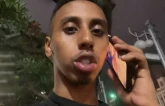
Assange spent the night in the embassy in central London on Tuesday after making a dramatic bid to avoid extradition to Sweden, where he is wanted for questioning over alleged sex crimes. His supporters say the case is just a means to prosecute Assange for leaking hundreds of thousands of confidential documents.
With time running out in his marathon legal battle to avoid being sent to Stockholm, the 40-year-old Australian walked into the embassy Tuesday and claimed asylum under the United Nations human rights declaration.
Ecuador has said it is examining the request, the latest twist in a case dating back to December 2010 when the founder of the whistle-blowing website was first detained in London on a European arrest warrant.
Ana Alban, the Ecuadorian ambassador, said in a statement on Wednesday that she had held "cordial and constructive" talks about the asylum bid with Britain's Foreign Office.
"I also emphasised to the UK government that it was not the intention of the Ecuadorian government to interfere with the processes of either the UK or Swedish governments," she added.
The embassy said Assange would remain in the building under the protection of the Ecuadorian government while his application is considered.
But police said that by spending the night there, Assange had breached conditions to stay at his bail address between 10:00 pm and 8:00 am and "he is now subject to arrest under the Bail Act for breach of these conditions".
Britain's Foreign Office said however that because Assange was still on diplomatic territory he was "beyond the reach of the police".
A group of eight supporters gathered outside the building in the upmarket Knightsbridge district, waving "Free Assange" placards.
"I think the US and many others are trying to silence him," said Assange supporter Belgica Guana, an Ecuadorian who lives in Britain, as she stood outside the embassy.
"I think my president of Ecuador will take the right decision, because he is a man who respects human rights and because he knows the political issues against Assange."
WikiLeaks spokesman Kristin Hraffnson was seen entering the embassy where he was due to see Assange, but he would not comment on whether he had known of his colleague's intention to seek asylum.
The embassy confirmed it would be seeking the views of London, Stockholm and Washington to ensure it complied with international law.
Assange exhausted all legal options in Britain last week when the Supreme Court refused to reopen his appeal against extradition.
He has until June 28 to lodge an appeal at the European Court of Human Rights in Strasbourg.
Assange denies the allegations of rape and sexual assault made by two female former WikiLeaks volunteers and maintains the moves to extradite him to Sweden are politically motivated.
He believes the ultimate aim is for him to be handed over to US authorities.
WikiLeaks enraged Washington by releasing a flood of classified US information about the wars in Iraq and Afghanistan, as well as more than 250,000 classified US diplomatic cables that embarrassed a slew of governments.
Vaughan Smith, a supporter of Assange who hosted him at his country mansion for 13 months, told BBC television: "I genuinely believe that he fears for his life and he fears that if he goes to Sweden he'll be sent to America.
"And you only need to look at the treatment of Bradley Manning by the Americans to feel that he's right to be fearful."
Manning, a US soldier, is facing trial on charges of passing a huge cache of documents to WikiLeaks.
Assange is on £240,000 ($380,000, 300,000 euros) bail, put up by celebrity supporters including filmmaker Ken Loach and Jemima Khan, the former wife of Pakistan cricket captain turned politician Imran Khan.
Ecuador offered Assange residency in 2010 after expressing concern about some of the alleged US activities revealed by WikiLeaks.
Assange interviewed Ecuador's President Rafael Correa for his talk show aired by Russia's RT television station in April.
COMMENTS (2)
Comments are moderated and generally will be posted if they are on-topic and not abusive.
For more information, please see our Comments FAQ


1731975305-0/Untitled-design-(40)1731975305-0-165x106.webp)
1731975060-0/Untitled-design-(39)1731975060-0-165x106.webp)













Assange was cheered up by the Ecuador's president Rafael Correa, who welcomed him to the "club of the persecuted". Assange was encouraged by these friendly words and felt Ecuador were more sympathetic to his stand vis-a-vis the United States.
Come to Pakistan! Build a villa in FATA & live in peace hereafter or thereafter.